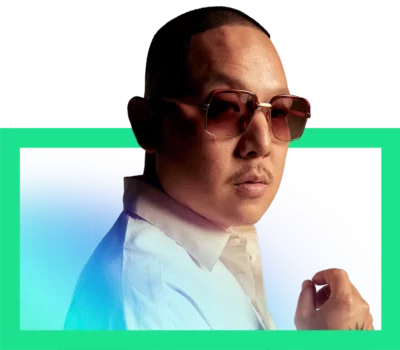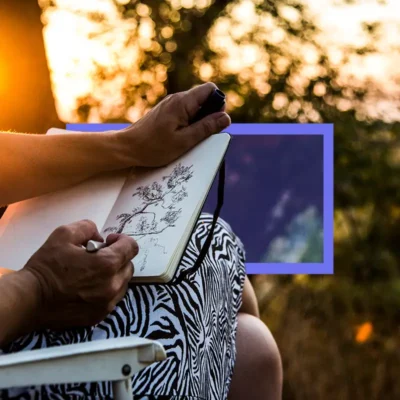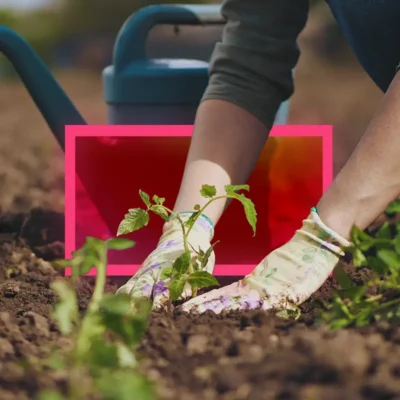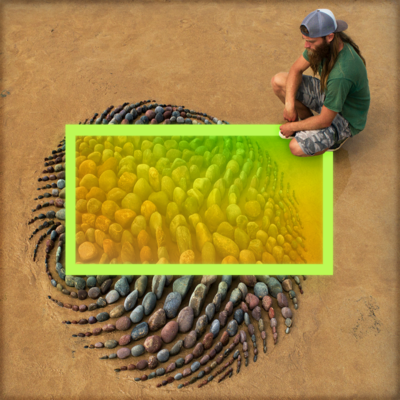There’s nobody like you
In 2009, Eddie Huang, author of the acclaimed memoir Fresh Off the Boat, opens Baohaus, his first Taiwanese restaurant on Manhattan’s Lower East Side. It’s a wild, chaotic gamble that exemplifies Eddie’s spirit. But as the restaurant’s success grows, Eddie is faced with the challenge of either sticking to his principles or living someone else’s dream for his life.
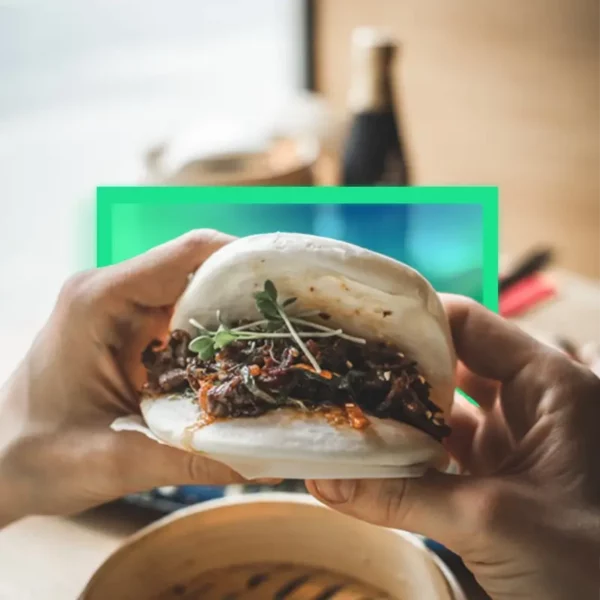
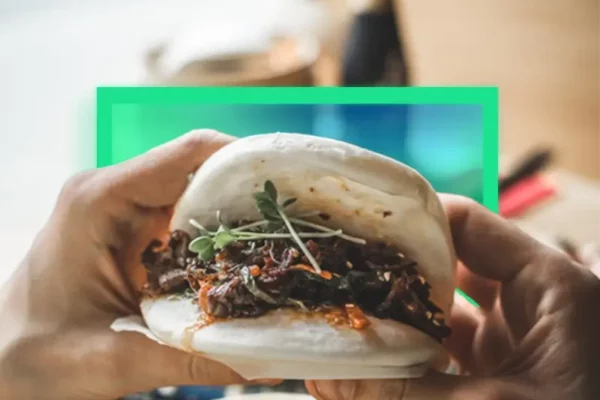
Table of Contents:
Transcript:
There’s nobody like you
EDDIE HUANG: I look out into the small dining area. It’s a tiny, 400-square-foot space. Subterranean, no windows. It used to be an ice cream shop with maybe three seats. Now it has 12 cheap plastic stools I bought from Ikea. The bathroom doesn’t work. My thought is this: if the food is good enough, people will come.
ROHAN GUNATILLAKE: Author, chef, and TV personality Eddie Huang spends much of his early life struggling to find his purpose. Along the way, friends and family try to tell him what that purpose should be. But, as we’ll hear in this week’s story, Eddie’s experience opening his raucously successful Taiwanese restaurant, Baohaus, teaches him that he can’t and shouldn’t spend his life living other people’s dreams.
In this series, we combine immersive first-person stories, breathtaking music, and mindfulness prompts, so that we may see our lives reflected back to us in other people’s stories. And that can lead to improvements in our own inner lives.
From WaitWhat, this is Meditative Story. I’m Rohan, and I’ll be your guide.
The body relaxed. The body breathing. Your senses open, your mind open, meeting the world.
HUANG: I walk in off Second Avenue, and the place smells funny, even for a video store. It smells more like a Goodwill. My head tilts to one side as I walk slowly past shelves filled with DVD cases. Aisle after aisle, all organized by director. Every kind of film is represented. I hear snippets of a conversation from behind the counter. One of the clerks discusses new cult horror with the customer. Another recommends Canuck Noir films, Canadian thrillers. I can ask anyone who works here about any movie or any genre. Every employee has a different opinion, different expertise.
I listen to their suggestions. I browse the aisles. I talk to people and I get put on to film sub-cultures I don’t have any idea exist. Like French New Wave, Taiwanese New Wave. It seems like every culture has its own Wave. And I love it.
This is Kim’s Video — a landmark in the East Village in New York City. I’m 25. I stumbled into this place a few months back, and now, I come here a lot. The films I discover here open me up to worlds that I want to dive into. Nothing like this exists where I grow up in Orlando.
Growing up, I’m surrounded by a lot of different cultures, but everyone’s expected to act in a similar fashion. Everybody works for Disney or in the hospitality industry that supports Disney. They’re married to the mouse. Even my dad has a restaurant that caters to tourists going to Disney. No one realizes how insular the culture is. But I do. I grow up existing in the margins — staring at the cocoon that everybody else is walking around in. I’m the son of two Taiwanese immigrants. I love southern hip hop, graphic novels. I get into a lot of fights. I don’t feel like I really connect to anyone. I feel silenced.
I keep looking for spaces where I don’t have to feel weird. Or, at least spaces where I’m accepted for being weird.
That’s what I start to find in New York. I move here in the mid-2000s. I gravitate to places like St. Mark’s Comics, where people play Dungeons & Dragons or Magic the Gathering in the backroom. I connect with people who obsess over streetwear. They’re cool, but not trying to be too cool yet. But New York is changing. I can tell all of these spaces are in danger of disappearing.
Taiwanese culture has fans here too. The Asian food scene is starting to take off. Sometimes it’s whitewashed, sometimes it’s bad, but it’s a start. People are curious about where I’m from, but there’s nowhere to point them. I wonder if it’s possible to represent the Asian American experience in a way that feels more exact in Manhattan. And I feel the urge to do something about it.
I know how to cook. I like to host. I start to think on that. Maybe I can open my own place — a place like Kim’s video, but for the food and culture I care so much about. Maybe I can make a place where I can be me.
I grab a fistful of szechuan peppercorns and toss ’em into the wok. The recipe consists of ginger, garlic, scallions, dried red chilis, szechuan peppercorns, and star anise — the Chinese mirepoix. It sizzles when it’s hit with rice wine and soy sauce. I lay the pork belly into the braise with a brick of rock candy and let it simmer for a couple of hours. Next to me, the buns steam in Lotus leaves.
“Smoke break,” I tell this guy, Asa. He’s an NYU student, never worked in a kitchen in his life, but here he is, working in the new restaurant, Baohaus, on Manhattan’s Lower East Side. We serve the food I grew up eating. And we make it good.
It’s 2010. I’m 27 years old. We’ve only been open a few months. We assemble baos one after another. Asa’s wild sweaty. It’s hot in the kitchen, even in the winter.
“How much of this should I put on top?” he asks, reaching for the chopped peanuts.
“Don’t think about it too much. It’s just one, two, three. 15 seconds, you’re done.” I show him as I top the bao with pickled mustard green, cilantro, crushed peanuts, and Taiwanese red sugar. “If the bao doesn’t burn the customer’s hand, it’s cold.” Taiwanese people will judge you on how hot the bao is when it hits their hand.
Asa nods. It’s a lot, but he accepts it. I like this guy.
I look out into the small dining area. It’s a tiny, 400-square-foot space — subterranean, no windows. It used to be an ice cream shop with maybe three seats. Now it has 12 cheap black plastic stools I bought from Ikea. The bathroom doesn’t work.
My thought is this, if the food is good enough, people will come. They’ll suffer the environment. The day we open, there’s about $200 in the register — all I have to my name. I think, “Well, we better make some money today.”
Luckily, we do.
Asa picks up the pace. He’s found his pocket. Another guy we hired collects early Memphis rap tapes. We play ’em in the restaurant. He’s always late, and he’s a terrible cook, but I like the ancient Three 6 Mafia tapes.
Before we open, I post a job listing with a Ghostface lyric. It says: “Scooby snack Jurassic plastic gas booby trap. Baohaus looking for cooks and cashiers. Hit us up if you wanna work here.” That’s it.
I don’t care about anyone’s restaurant skills. No one knows how to make this food anyway. Maybe they’re really good at art or graphic design or making playlists. When I had no experience, everyone asked me for my credentials. But I just needed a chance. So that’s what I’m giving people at Baohaus.
It’s probably not efficient, but the place has a real special energy. Everyone here is curious. At the end of the day, we’re all here because we’re trying to figure out how to create a truly Taiwanese American restaurant.
The restaurant I grew up in was nothing like this. In Orlando, my dad owned a successful steak and seafood restaurant. But it was a business venture — a place for families and tourists. One day, when I’m 15, 16 my dad sits me down and says, “You’re going to take over the restaurant. You’re going to run it after me.” That’s his dream for my future.
But to me, that doesn’t make sense. “That’s your thing,” I say. “It’s not mine. What’s the point of me spending my life running a restaurant that you already ran?”
It’s sacrilege. It breaks his heart. He gave up a lot to come to America, have me in his twenties, and do something that wasn’t necessarily in his heart, to support his family. All he wants to see is that I appreciate it, and while I do, he takes my desire for independence as a rejection. At that age, I’m still not sure what I want to do with my life, but I know I want to do something that’s truly mine.
Baohaus is more than a restaurant, it’s a youth movement. A place for all these weirdos to belong. Places like that in this neighborhood are dying. I want to make sure that this one stays alive. It’s not my dad’s dream. It’s not how he saw my future playing out. But that’s okay. It’s mine.
GUNATILLAKE: There’s a real energy here to Eddie’s commitment to being himself. So much meaning. What in your own life, does it remind you of? And can you feel that energy right now? Eddie’s and yours?
HUANG: I take the top off the boiling stock pot and hold my face over the steam. Simmering beef bones and meat — a thin layer of savory fat glistens on the surface. It smells good. This is the Taiwanese beef noodle soup.
I’m exhausted. My t-shirt and champion sweats are stained. I’m working another double, but this dish is quiet time for me. It takes patience. You gotta babysit it. But I enjoy it.
I haven’t taught anyone else how to make this soup yet. We haven’t even put it on the menu. I make it in small batches, maybe 15 orders a day. I’m selective about who I give it to.
I grab a clean spoon off the counter and taste the rich, steaming broth. I have to say… I think it tastes better than my mom’s.
My entire love of cooking comes from my mother, and I’m competitive about it. It’s a shame, but we don’t really have many common interests besides food. When I think about it, it makes me sad, but I think it’s a common first generation experience. And even if it’s not, it’s mine. I’ll never know what it’s like to grow up in China or Taiwan, but I understand our food. Food is the thing that keeps me connected when it feels like being an immigrant is a burden. I don’t know if the burden is with America or my mom, but the food keeps me connected irregardless.
She always has three to five dishes on the stove at all times. That’s how Taiwanese people eat — a little pork, a little rice, some vegetables … always a full spread. I prep ingredients, watch what she does, think about how I could do it better.
But my mom doesn’t want me to run a restaurant. She wants me to do something better. To her, that means being a banker, or an accountant, lawyer, or an engineer. That’s it. She’s very traditional. To me, that sounds wack. I don’t think being a lawyer is my purpose. That doesn’t feel like me.
At Baohaus, I only leave the kitchen when my feet hurt. And right now, they hurt. So I go out to the dining room.
I sit across from a couple and their baby. The mom is breastfeeding. The guy says he’s a musician, recording wild sounds in China. We start talking about movies, and he tells me I should watch this film by Edward Yang, A Brighter Summer Day. It’s set in Taiwan. It’s about the youth gangs. I’ve never heard of it.
I appreciate the recommendation. I go back to the kitchen, and I bring them a bowl of beef noodle soup. I think the woman will like it. It’s good for babies. She finishes the whole bowl. I think she enjoyed it.
It’d probably sell well, but I don’t really care. I care about these moments where I can connect over something that represents my experience, something that’s truly lived, something that is perhaps universal.
GUNATILLAKE: Eddie is acting here more like an artist or curator than he is an entrepreneur. I love that. So let’s take that as an invitation for the next few days — like Eddie, to connect with someone new by expressing your story. By being you.
HUANG: I’m standing in a grease stained t-shirt in the apartment I share with my two younger brothers, Emery and Evan. I see the sun stream in through the window and a family of tourists walk by. We live on the ground floor of a tenement building on Orchard Street. It’s literally on the same street as the Tenement Museum. We have one room with three mattresses on the floor. Today, the space feels smaller than usual.
“Come on, man,” my brother Evan says. “Think of what we could do with that money.”
I raise my arms in frustration. I am thinking. That’s all I’ve been doing all day.
Baohaus has been open six months. Evan’s been here since day one, but we got so busy that Emery had to move up from Orlando as well. We got a positive mention in the New York Times, and it turns out the woman I gave beef noodle soup was a journalist.
I felt silenced for so much of my life and for the first time, people are curious about my food and perhaps, about what I have to say. One of my friends said, “You’re zeigeisting!”
I had to look it up. By every measure in the restaurant industry, we’re a success. But we’re broke. Really broke. Like, mattress-on-the-floor-with-your-brother’s-moving-up-from-Orlando broke.
That’s when some tech guys I know reach out to me and make an offer: a quarter of a million dollars to open another Baohaus location. In exchange, they’ll own a big part of the business. Immediately, my brother Evan loves it. He wants to scale.
Evan is younger than me. When he grew up, my parents had money. So, it was a little bit different. Business is business to him. He doesn’t feel the same loyalty to micro subcultures and made up neighborhoods that I do. I respect him, and I respect his perspective. We’re just coming at it from two different angles because we lived a different experience. I think when you’re a weirdo or an outsider, you cling to the little things like a comic book or a song or a board game or a book, and you know how much it means to you. And when you create something like Baohaus, that starts to mean something to other people, you know how important it is not to take that away.
I can see the upside to taking the deal. With that money we could fix the bathroom, hire more cooks. Everyone has this belief that if you’re not growing, you’re dying. Without that money, we could be closed in a year. But I understand the reality too.
“Alright, $250,000. It’s not that much money,” I say. “Restaurants lose that much in a month. The tech guys aren’t going to run the other location. Who’s gonna run it? You?”
Evan knows I’m just arguing with myself. The truth is, Baohaus is personal. It’s not just a business. I don’t trust anyone else to run it — not even my family.
“Listen,” Evan says, pacing the best he can in the cluttered space. “This is how they explained it to me. They said, ‘in our business Eddie is a founder. He’s passionate, but he’s not an operator. Evan, you’re an operator. Because Eddie’s not realistic.’”
I nod my head slowly. I appreciate my brother being straight with me. He’s honest, and he doesn’t mince words. I’m not mad at him, but I’m also not budging.
All my life people have been trying to get me to care about their aspirations — to succeed in the way that they want me to succeed. But I’ve only ever wanted to be me.
My brother and I argue late into the night. This is a huge decision, and maybe it’s the wrong one. But I tell them that no way can I see turning Baohaus into something uniform and impersonal. “Yo, Evan, they want me to put hot sauce on all the tables!”
“So!” he says, “Who cares? Put the hot sauce on the tables.” He looks at me like I’m crazy. And I probably am. To them, it is a business. But to me, it’s an idea. It’s a principle to organize around. But more than anything, it means something to me. Baohaus has to exist in a certain way for it to be Baohaus. It’s not the same with hot sauce and branded napkins and QR codes on every table. That feels artificial. That’s not why people come here.
I didn’t make all the decisions I made with Baohaus, so I could someday make it bigger, more homogenous, more corporate. It was about connecting with people. Expressing who I am, putting myself out there, and letting other people do the same. That’s my goal. And that’s my purpose.
I walk down the aisle between two long rows of tables. My eyes scan the light blue wall at the back of the room. Posters from Hong Kong gangster movies I love line the wall and a poster of Edward Yang’s A Brighter Summer Day, now one of my favorite films.
I’m in London. It’s 2023. We’re doing a Baohaus pop up. I’m here for a couple weeks, training the staff, planning the design.
After I turn down the tech money, Baohaus in New York continues to operate for 10 years. I get lucky. I start writing books, hosting food travel shows, and just directed my first film. Then the pandemic hits. We’re one of the first places to close our doors for good, so that our employees can stay safe and get unemployment. We still have fans around the world.
There’s a bootleg Baohaus in India. There’s a bootleg Baohaus in Argentina. They still got our T-shirts, and they believe in this thing. The idea stays alive.
The truth is, I’m a romantic. I want real relationships. I want real connection. This pop-up in London looks different from our original New York location — less graffiti, more seats, a bathroom that works. It’s less in-your-face. It’s grown up. I’m 41. I’m grown up too.
There’s no way that this restaurant is gonna be as rowdy and loud and rebellious. It shouldn’t be.
But it’s still me. The ideas are intact.
When you’re young, when you don’t know your own identity yet, everyone’s gonna try to convince you to live their dreams, to aspire to their goals, to believe in their mission. So, you do your best to find your place. You look around and think, am I like this guy? Or that guy? It’s a fun game to play. But as you grow up, you realize there’s nobody like you.
Baohaus will always be special to me. It came out of me in a moment when I was frustrated. It gave me a chance to represent my immigrant experience. My family. It was a place where I didn’t feel weird. None of us did there.
When we’re lucky enough to find things that we love. Things that truly touch us. Things that give us purpose. Things that make us feel alive and answer the question why we’re here, why we’re us and nobody else, we have a responsibility to not throw that away. To not surrender that knowledge, in order to meet someone else’s definition of success. Because nobody is, and nobody can do what you do.
Rohan’s closing meditation
GUNATILLAKE: Thanks so much, Eddie.
You know something in me really resonates with Eddie’s indie attitude. I totally get the need to stay true to your principles, stay true to yourself. To follow your own dream, not that of someone else, even when conventional success might be elsewhere.
Yes, there are mentors and teachers along the way, but there is a point when you just have to do it your own way, because there is no one quite like you. It’s one of life’s great mysteries: despite all that we share with others, we are still unique.
So that’s the vibe we’re going to riff off in our closing meditation together.
In a typical guided meditation, there’ll be someone like me heading it up, being the guide. And what the guide does is basically tell you what to do with your attention. Do this, pay attention to that, try to reflect on this … things like that.
But today, how about we do something different? Today, I’m not going to tell you what to do. You’re going to sense into what you feel you need to do. Find your own path.
As a bit of an inspiration, you could use a classic technique:
There’s body awareness, feeling the sensations of the body, knowing them directly.
There’s also mind awareness, noticing what thoughts and moods and patterns arise in the mind.
You can do either of these in a very focused way, or you can be a bit more free and easy, letting the awareness roam around your body or mind, noticing whatever comes up.
Or you can do your own thing. You might have a meditation or mindfulness technique that you’ve done before, which feels like the right thing to do, so do that.
Or if you want to just hang out, you can do that too.
Whatever it is, I’ll be back in a bit.
Hey, I’m back.
We’ll do that again, but first let’s reset. Whatever you did just now, let it go, and sense into what is the technique or emphasis that is most calling for you now, in this moment, not from before.
Is it focus? Is it relaxation? Maybe it’s body. Or maybe it’s mind. Is it gratitude? Or is there a feeling that you just want your attention to be totally freestyle?
Sense into what type of meditation will be most you, and I’ll give you another little snippet of silence to give it a whirl, and then we’ll wrap up.
So, back in the day when my mindfulness adventures really got going, I noticed that backing my intuition and sensing what was the kind of thing I needed to do and doing that, rather than following a set pattern, really paid off.
And when I started to share my understanding of mindfulness with others, I deliberately worked out how to do it differently to other people, and in my own unique voice.
So how about we, inspired by Eddie, take this intention for the next few days ahead.
Let’s get interested and reflect on how much of what we do is in service of other people’s dreams and how much is in service of our own. There’s no right answer, but it is a valuable question.
And alongside that, do take care of yourself this week. Recognize your “you-ness,” celebrate it, and take care of it. That sounds like a very good thing to do.
So thank you again, Eddie, for your story and the way you walk through the world.
And thank you. Go well.
We’d love to hear your personal reflections from Eddie’s episode. How did you relate to his story? You can find us on all your social media platforms through our handle @MeditativeStory, or you can email us at: [email protected].

